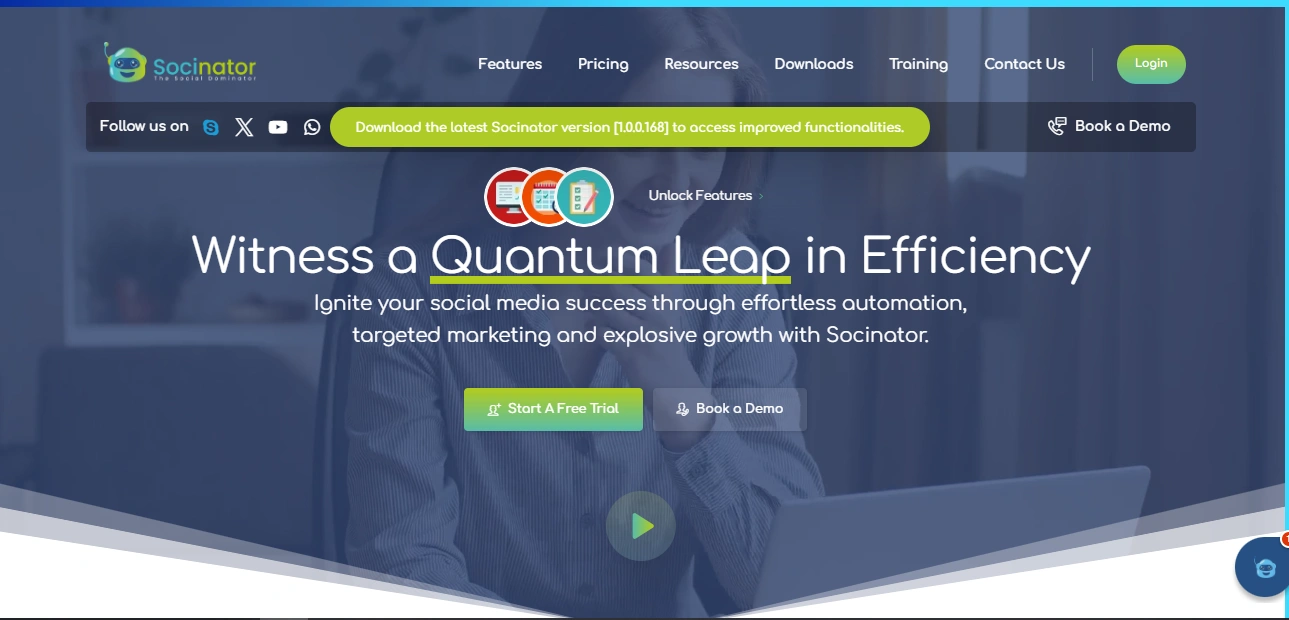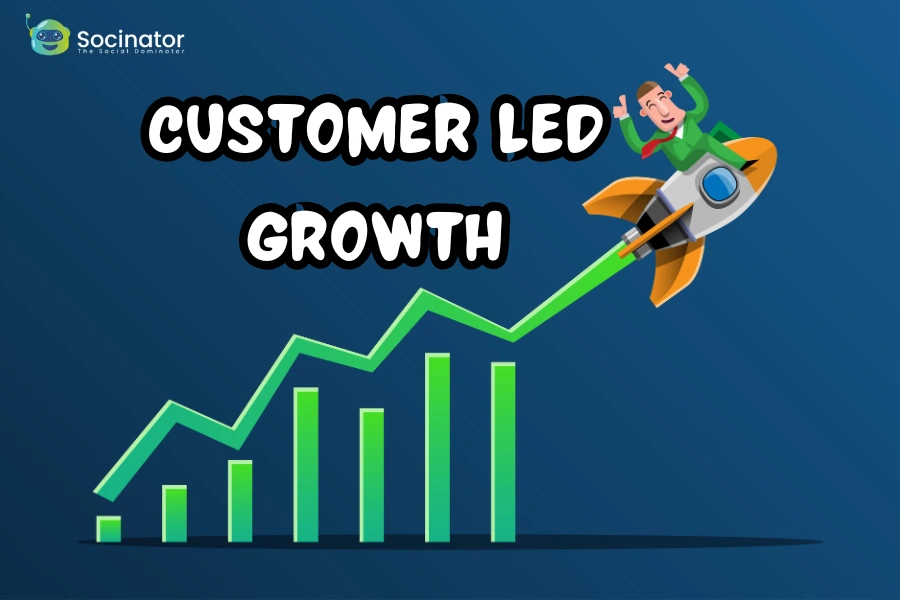Are you bored of hearing the same old sales talk? Let’s talk about something way cooler: turning your customers and employees into your biggest cheerleaders. Indeed, we’re taking a comprehensive look at social media advocacy.
Think about it: wouldn’t it be awesome if your customers were so stoked about your product, they couldn’t stop talking about it? And what if your team was as passionate about your company as you are? That’s the magic of social media advocacy. It’s like having an army of brand ambassadors working around the clock.
Now, Let’s get started!
In a hurry? Listen to the blog instead!
Understanding Social Media Advocacy
Social media advocacy involves strategically using social platforms to encourage customers, employees, and other stakeholders to become brand ambassadors. It entails fostering a sense of customer loyalty, engagement, and empowerment among these individuals. This inspires them to share positive experiences and recommendations with their networks. This organic word-of-mouth marketing can significantly impact brand reputation, customer acquisition, and overall business success.
Key Elements:
- Employee Advocacy: Employee advocacy refers to the practice of empowering employees to share their genuine experiences and insights about the company on social media. This can include sharing stories about the company culture, showcasing team events, or discussing the products and services they believe in. When employees share positive content, it personalizes the brand and enhances its credibility.
- Customer Advocacy: Customer advocacy focuses on encouraging satisfied customers to share their positive experiences with the brand, products, or services. This can be through reviews, testimonials, or social media posts highlighting their satisfaction. When customers advocate for a brand, they effectively act as brand ambassadors, spreading word-of-mouth recommendations to their networks.
- Influencer Advocacy: Influencer advocacy involves partnering with influencers who resonate with the brand’s values and mission. These influencers have established trust and authority within their communities, making them effective advocates for products and services. By promoting the brand to their followers, influencers can significantly expand the brand’s reach and impact.
Benefits:
- Enhanced Reach: Advocates leverage their networks to expand the brand’s reach beyond its immediate followers.
- Authenticity: People view messages from real individuals as more trustworthy than traditional advertising.
- Engagement: Advocacy campaigns typically achieve higher engagement rates than other marketing efforts.
The Indispensable Role of Customer Advocacy
 Customer advocacy is essential to the success of any thriving business. When customers become staunch supporters, they become an invaluable asset. Their testimonials, recommendations, and positive word-of-mouth marketing can significantly impact a brand’s reputation and customer acquisition. By prioritizing customer satisfaction and building long-term relationships, businesses can foster a loyal customer base that acts as a powerful force in driving growth and market share.
Customer advocacy is essential to the success of any thriving business. When customers become staunch supporters, they become an invaluable asset. Their testimonials, recommendations, and positive word-of-mouth marketing can significantly impact a brand’s reputation and customer acquisition. By prioritizing customer satisfaction and building long-term relationships, businesses can foster a loyal customer base that acts as a powerful force in driving growth and market share.
Strategies to Foster Customer Advocacy:
- Exceptional Customer Service: Providing outstanding support and exceeding customer expectations creates advocates.
- Loyalty Programs: Rewarding repeat customers with incentives such as discounts, early access, and exclusive offers.
- Engagement and Feedback: Actively seek customer feedback and involve them in product development or improvements.
How Can Social Media Listening Increase Customer Advocacy?
Social media listening is the art of paying attention. By closely monitoring online conversations, businesses can glean invaluable insights into customer sentiments, preferences, and pain points. This information serves as a goldmine for identifying potential advocacy opportunities. When customers share positive experiences, express gratitude, or go above and beyond to support the brand, it’s a chance to highlight their advocacy. Recognizing and rewarding these champions strengthens their loyalty and inspires others to follow suit.
What Benefits Can Brand Advocates Offer You?
Brand advocates are passionate customers, employees, or partners who enthusiastically promote your business. They can significantly benefit your brand in several ways:
Enhance Brand Visibility and Reputation –
Enhancing brand visibility and reputation involves spreading positive word-of-mouth, as advocates share their favorable experiences with others, significantly expanding your brand’s reach. Additionally, these advocates boost your social media presence by amplifying your brand’s message through content sharing, audience engagement, and excitement creation. Their positive reviews also improve your online credibility, fostering trust and attracting potential customers.
Drive Customer Acquisition and Sales –
Utilizing advocates to refer new customers expands your lead pipeline. Advocates to refer new customers, thereby expanding your lead pipeline. Their recommendations can significantly influence purchasing decisions, guiding potential customers toward your brand. Additionally, through their endorsements and promotions, advocates can boost sales, ultimately increasing your revenue.
Provide Valuable Customer Insights –
Advocates play a crucial role in offering feedback by sharing their thoughts on products, services, and overall customer experiences. Their input not only helps improve offerings but also guides product development and enhancements. Additionally, advocates provide valuable insights into how the target audience perceives your brand, shaping brand perception effectively.
Foster a Strong Brand Community –
Advocates engage with customers to create a sense of community and loyalty, deepening brand relationships and strengthening connections between your brand and its audience. By fostering these relationships, advocates help retain customers and maintain long-term loyalty.
In essence, brand advocates function as a dedicated, unpaid marketing team, managing your brand’s reputation, driving sales, and providing valuable feedback.
Establishing a Powerful Social Media Advocacy Strategy –
 Creating a social media advocacy campaign requires strategic planning and a clear vision. Here’s a detailed guide to help you establish a powerful and impactful campaign:
Creating a social media advocacy campaign requires strategic planning and a clear vision. Here’s a detailed guide to help you establish a powerful and impactful campaign:
Set Clear Goals –
Start by defining your objectives. What do you hope to achieve with your advocacy efforts? Consider these common goals:
- Increase Brand Awareness: Expand your brand’s visibility and recognition across social media platforms. The goal is for your brand to be top-of-mind for your audience.
- Drive Traffic: Use social media to direct users to your website, blog, or landing pages. Increased traffic can lead to higher engagement and conversions.
- Boost Conversions: Convert social media interactions into actionable results such as sales, sign-ups, or leads. Track how well your advocacy translates into business outcomes.
- Enhance Engagement: Foster deeper connections with your audience. Promote significant interactions and dialogues centered on your brand.
- Build a Strong Reputation: Develop a positive brand image and gain trust through authentic and credible advocacy.
Clear goals will provide direction and help measure the success of your strategy.
Identify Your Advocates –
Recognize who will best represent your brand and help achieve your goals:
- Employees: Your internal team understands your brand’s values and messaging. Their insider knowledge and enthusiasm can be powerful in authentic advocacy.
- Customers: Loyal customers can provide genuine endorsements and share their positive experiences. Their voices can be more relatable and persuasive to potential new customers.
- Influencers: Industry influencers and thought leaders can help extend your reach beyond your immediate audience. Their established credibility can lend additional weight to your brand’s message.
Choose advocates who are passionate and well-aligned with your brand’s mission and values.
Create Valuable Content –
Develop content that resonates with your audience and is easy for your advocates to share:
- Blog Posts: Craft informative and engaging articles that showcase your brand’s expertise. These can serve as shareable assets for your advocates.
- Infographics: Create engaging visuals that simplify complex information for better understanding. Infographics are highly shareable and can drive engagement.
- Videos: Produce compelling videos that capture attention and convey your message effectively. Videos are often more engaging and can reach a wider audience.
- Updates and News: Share relevant industry updates and company news. Keeping your advocates informed helps them stay engaged and active.
Ensure your content is high-quality and matches your brand’s message and goals.
Provide Training and Tools –
Equip your advocates with the knowledge and resources they need to succeed:
- Training Sessions: Offer workshops or webinars on social media, best practices, and advocacy techniques. Training helps ensure consistent and impactful messaging.
- Content Guidelines: Provide clear guidelines on how to share content, maintain brand voice, and engage with followers. It helps to maintain brand consistency.
- Scheduling Tools: Utilize tools like Socinator to streamline content scheduling and management. These tools can help advocates share content at optimal times and track engagement.
Well-prepared advocates will be more confident and effective in their efforts.
Socinator – The Ultimate Social Media Automation Tool:
Socinator is designed to simplify and supercharge your social media management across various platforms. Whether you’re a business, marketer, or social media manager, Socinator aligns seamlessly with your social media advocacy efforts, making it an indispensable tool for your online strategy.
Key Features of Socinator –
-
Automated Scheduling
Effortlessly schedule posts in advance for a variety of social media platforms, including Facebook, Instagram, Twitter, LinkedIn, and Pinterest. By adhering to a regular posting timetable, you can maintain your audience’s interest and engagement.
-
Multiple Account Management
Seamlessly manage multiple social media accounts from a unified dashboard. Switch between accounts effortlessly, allowing you to coordinate your social media strategy across all platforms with ease.
-
Audience Engagement
Enhance interaction and build a community by automatically liking, commenting, following, and unfollowing based on your specified criteria. Engage with your audience in real-time, fostering meaningful connections.
-
Advanced Analytics
Track and analyze performance metrics to uncover what resonates most with your audience. Gain valuable insights into engagement, reach, follower growth, and more, enabling you to fine-tune your strategy for optimal results.
Socinator is your partner in social media advocacy, empowering you to achieve your goals with greater efficiency and effectiveness. Embrace the power of automation and watch your social media presence soar.
Now, let’s come back to the topic.
Offer Incentives –
Motivate your advocates with rewards and recognition:
- Recognition: Publicly acknowledge and celebrate top advocates in newsletters, social media posts, or company events. Acknowledgment enhances motivation and promotes ongoing involvement.
- Exclusive Access: Offer early or exclusive access to upcoming products, services, or events. It can create a sense of exclusivity and value for your advocates.
- Rewards: Offer tangible rewards such as discounts, freebies, or gift cards. Incentives can drive increased participation and enthusiasm.
Incentives can help drive engagement and ensure that advocates feel valued.
Track and Measure Success –
Monitor the performance of your advocacy strategy to understand its impact:
- Engagement Metrics: Track likes, shares, comments, and other types of interaction. It helps assess how well your content resonates with the audience.
- Traffic Data: Analyze website traffic generated from social media posts. Tracking traffic can help gauge the effectiveness of your advocacy efforts.
- Conversion Rates: Monitor the number of social media interactions that result in conversions, like sales or sign-ups. It measures the direct impact of your advocacy on business outcomes.
- Brand Mentions: Track how often and in what context people reference your brand. Sentiment analysis can help understand public perception and brand reputation.
Use these insights to refine your strategy and address any areas for improvement.
Build a Community –
Create a supportive and engaging environment for your advocates:
- Host Events: Organize virtual or in-person meetups to foster connections among your advocates. Events can build stronger connections and improve teamwork.
- Encourage Collaboration: Create platforms or forums where advocates can share ideas, experiences, and feedback. Collaboration can lead to new insights and opportunities.
- Celebrate Achievements: Regularly highlight and reward the contributions of your advocates. Celebrating achievements helps maintain motivation and engagement.
A strong community fosters loyalty and enhances the effectiveness of your advocacy strategy.
Stay Flexible –
Adapt your strategy to keep pace with changes and trends:
- Follow Trends: Stay informed on the latest social media trends and platform updates. Incorporate new developments into your strategy to keep it fresh and relevant.
- Seek Feedback: Regularly gather input from your advocates and adjust your approach based on their feedback. Flexibility ensures that your strategy remains effective and aligned with your goals.
Being adaptable allows your strategy to evolve and remain impactful over time.
Also Read: –
Reputation Management Strategy: 8 Steps To Follow
10 Secrets To Enhancing Customer Loyalty And Retention
Conclusion
Transforming your customers and employees into passionate brand advocates can be a game-changer for your business. By crafting a strategic social media advocacy plan and nurturing solid relationships, you can unlock the power of word-of-mouth marketing. Remember, it’s not just about the numbers; it’s about building a loyal community that genuinely believes in your brand. So, are you ready to unleash the potential of your advocates and elevate your business to new heights?
Let’s turn your customers into your biggest fans!
FAQs: –
Q: Why is social media advocacy important?
Social media advocacy can significantly impact your brand’s reputation, customer acquisition, and overall business success. It helps build trust, increase brand visibility, and drive sales through authentic word-of-mouth marketing. For example, when a customer shares their satisfaction with your product on their social media, it reaches their entire network, acting as a trusted recommendation.
Q: How does social media advocacy differ from influencer marketing?
While both involve leveraging external voices to promote a brand, social media advocacy focuses on cultivating relationships with customers and employees, while influencer marketing primarily involves partnerships with established influencers.
Q: What are the different types of social media advocacy?
There are primarily three types of social media advocacy:
- Employee Advocacy: Encourage employees to share company news, products, and values on their social media channels.
- Customer Advocacy: Fostering loyalty among customers to become brand ambassadors who recommend products or services to others.
- Influencer Advocacy: Partnering with influencers to promote your brand to their audience.
Q: How can businesses encourage employees to participate in social media advocacy?
Encourage employee participation by providing training, offering incentives, and supplying ready-made content. Foster a positive company culture with team-building activities and transparent communication to boost enthusiasm for promoting the brand.









